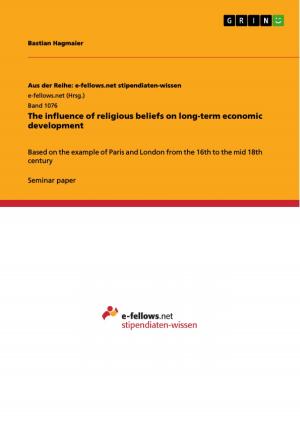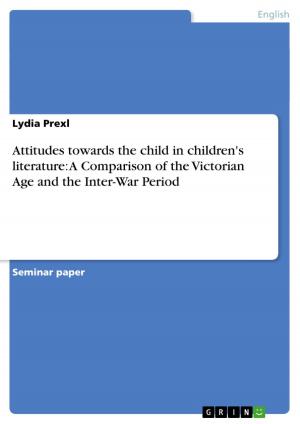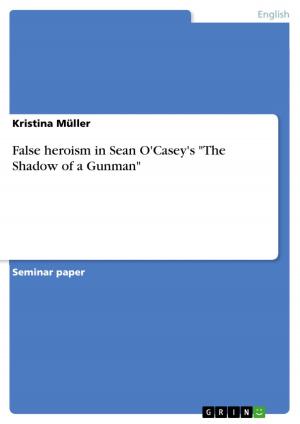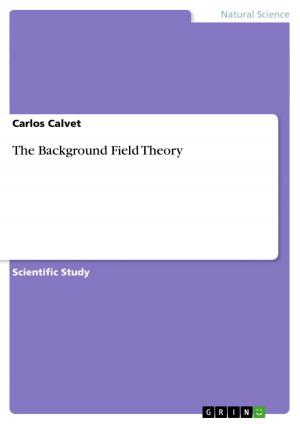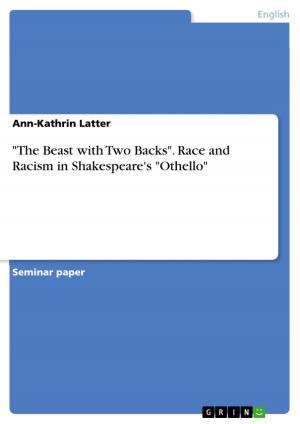Shakespeare's 'Macbeth' - Analysis of the influence of evil on the mainprotagonist Macbeth
Fiction & Literature, Literary Theory & Criticism, British| Author: | Jessica Hecht | ISBN: | 9783638184731 |
| Publisher: | GRIN Publishing | Publication: | April 14, 2003 |
| Imprint: | GRIN Publishing | Language: | English |
| Author: | Jessica Hecht |
| ISBN: | 9783638184731 |
| Publisher: | GRIN Publishing |
| Publication: | April 14, 2003 |
| Imprint: | GRIN Publishing |
| Language: | English |
Seminar paper from the year 2002 in the subject English Language and Literature Studies - Literature, grade: very good, Ruhr-University of Bochum (FB Anglistics), 9 entries in the bibliography, language: English, abstract: In this paper I am going to analyse the influence of evil on the mainprotagonist of Shakespeare's tragedy 'Macbeth'. In order to do this it is necessary to point out the way of analysis I prefer. First I will present some needed background information about the author himself and the Elizabethan World Picture. The next part introduces the reader to the play 'Macbeth' and its actions. This is in order to lead over to the proper analysis where I will try to identify the play's spirit of evil with its personifications in nature and other protagonists and special regard to its influence on Macbeth until he is finally destroyed by it. This analysis will be supported by further focus on the imagery and the language which Shakespeare has used. To understand and to be able to interpret Shakespeare it is necessary to know some important facts about the way of life and thoughts at Shakespeare's lifetime. The Elizabethan Era was characterised by hierarchy and thoughts of extreme order. People thought that everything in the universe had got its own specific position in their strict order. You can find this world of ideas in the assemblage of the universe as well. This cosmological constellation hasn't told only about the order and the position of the human being in this cosmos but also about the relations of the interconnected creation and the relation between cosmos and God (cf. picture 1 on p. 15) The ideas of this world picture can already be found in the antiquity but it was improved in all its details by the scholastic philosophy. In this chapter of my paper I am going to introduce you to one of the three main forms of the Elizabethan World Pictures: the chain of being. The whole universe is divided into a ladder. At its ground there are the non-living elements and at its top there is God. At first you can find the elements, liquids, metals, then vegetation and the animals. The human beings stand over the animals because of their reason. The angels follow the human beings as non-materialistic and spiritual creatures. God is at the top as the creator of this chain. [...]
Seminar paper from the year 2002 in the subject English Language and Literature Studies - Literature, grade: very good, Ruhr-University of Bochum (FB Anglistics), 9 entries in the bibliography, language: English, abstract: In this paper I am going to analyse the influence of evil on the mainprotagonist of Shakespeare's tragedy 'Macbeth'. In order to do this it is necessary to point out the way of analysis I prefer. First I will present some needed background information about the author himself and the Elizabethan World Picture. The next part introduces the reader to the play 'Macbeth' and its actions. This is in order to lead over to the proper analysis where I will try to identify the play's spirit of evil with its personifications in nature and other protagonists and special regard to its influence on Macbeth until he is finally destroyed by it. This analysis will be supported by further focus on the imagery and the language which Shakespeare has used. To understand and to be able to interpret Shakespeare it is necessary to know some important facts about the way of life and thoughts at Shakespeare's lifetime. The Elizabethan Era was characterised by hierarchy and thoughts of extreme order. People thought that everything in the universe had got its own specific position in their strict order. You can find this world of ideas in the assemblage of the universe as well. This cosmological constellation hasn't told only about the order and the position of the human being in this cosmos but also about the relations of the interconnected creation and the relation between cosmos and God (cf. picture 1 on p. 15) The ideas of this world picture can already be found in the antiquity but it was improved in all its details by the scholastic philosophy. In this chapter of my paper I am going to introduce you to one of the three main forms of the Elizabethan World Pictures: the chain of being. The whole universe is divided into a ladder. At its ground there are the non-living elements and at its top there is God. At first you can find the elements, liquids, metals, then vegetation and the animals. The human beings stand over the animals because of their reason. The angels follow the human beings as non-materialistic and spiritual creatures. God is at the top as the creator of this chain. [...]





